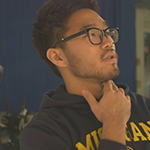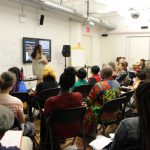Conversations| IAP Detroit Participants Jasmine Rivera and June Bae
Mentor and Mentee share their experiences from the Immigrant Artist Mentoring Program.
Jasmine Rivera is a director, writer, producer, and actor from Detroit. Her films have been screened in film festivals around the country, winning numerous awards. Rivera’s latest narrative short, American Prophet, is set in 1968 Detroit and based on the true story of peacemaker Bishop Thomas Gumbleton.
For three months, Rivera generously shared her expertise, knowledge, and contacts with her talented, dedicated, and humorous mentee June Bae as part of the Immigrant Artist Mentoring Program: Detroit. Bae’s trajectory as a filmmaker went from what he calls “years of heartbreak in the advertising world,” to a leap of faith that granted him the “Audience Award” in the Detroit 48 Hour Film Project. We talked to both mentor and mentee about their relationship and the impact of IAP on their lives.
NYFA: Can you tell us about your experience participating on the Immigrant Artist Mentoring Program?
June Bae: The mentorship aspect of the program was a great experience. Jasmine really took me under her wing and took a lot of time and interest in the projects I was working on, helping me to develop my process and my practice as a filmmaker. She also took me to multiple events where she would walk me around to meet different individuals in the Detroit film community. All in all, it was great to have Jasmine in my corner. She was a fantastic mentor.
Jasmine Rivera: My experience as a mentor has been a great opportunity to get to know an inspiring filmmaker, June Bae, as well as a powerful community of rising and established immigrant artists in Detroit. With June, it was wonderful to meet a person who has a dedicated commitment to his craft, with a constant search for improvement and steady practice. I was very pleased to lend advice and connect June to other resources in the film community to supplement his projects. In turn, June’s dedication helped me to stay on my own course in producing my films, and it was a great benefit to have a peer to discuss ideas and issues with.
NYFA: How did you interact with each other during the program?
JB: My interactions with my mentor happened in four ways. First, she attended NYFA sessions with me and made time to talk in between sessions or lunch to review the different topics of the day. Second, we would communicate via email, keeping each other updated with progress on projects or different film events happening in the area. Third, we would meet in-person where we would spend more in-depth time, typically discussing some questions I had about filmmaking or a specific project that I was working on. Last but not least, we would meet at different film events she would know about, often introducing me to different people in the local film community.
JR: During the program, June and I met periodically to discuss progress with work, and to attend events such as screenings and film industry gatherings. At the conclusion of the program, both June and I began attending a local filmmaker workshop where a group of peers offers constructive criticism and resource-sharing to members.

NYFA: As a mentee, did the Immigrant Artist Mentoring Program have any direct impact on your art practice?
JB: It definitely helped me understand the areas of my practice that I had questions about, specifically on the topic of how to find funding. I feel that it has helped me fine-tune the non-artistic areas of my practice that are necessary; helping me to become more holistic in my practice. I think a direct result of the program is the first narrative short film that I’m currently in pre-production for.
NYFA: What projects are you working on at the moment?
JB: I have a couple of projects in the works at the moment. The first one is a narrative short film that was funded by a non-profit organization. I actually took some of the things I learned from the NYFA program and implemented them in my own way to fit my circumstances. I had to do a bit of creative thinking because film funding is different from other art disciplines, as I’ve learned.
The second project is a music video that I’m working on with a local band called SIAS. I can’t really talk too much about the project itself but another cool aspect of it is that I’ll be collaborating with another artist that I met through this program, Manal Shoukair. She’s a phenomenal visual artist and super stoked to have her part of the team. We also might possibly have another music video collaboration lined up after that.
Last but not least, I’m currently in the early stages of ideation for a new short film. This year has been packed with a lot of sponsored projects, which doesn’t always allow for complete creative expression because you’re doing it for some brand, group, or individual. I’m kind of burned out from all those projects so I feel the need to do something that I want to do. That’s what this short film will do for me: breathe some personal creative expression back into my life.
JR: I am producing a series of short films titled Belle Isle Elegy to be shot in June of 2019. I am also working on a feature screenplay while producing a neighborhood political documentary series called Democracy Detroit as well as a short documentary titled Marcelina, which follows a Congressional Medal of Honor Filipino World War II veteran and her immigrant journey. As a co-founder of Final Girls, a Detroit-based women’s filmmaker collective, I am helping to organize a series of educational workshops for local rising female-identifying filmmakers to promote the inclusion of women in the film industry.
NYFA: Can you give any advice or recommendations to artists from Detroit that are considering participating in this program?
JB: I would recommend this program to artists who are serious about trying to grow in their craft, and specifically to those who are trying to make their practice into a career, not a hobby. I would encourage participants to have an open mind and ask as many questions as they need to get as much out of the program as they can. Last but not least, I’d encourage participants to be proactive and engaged. Although at times some sessions are not specific to your discipline, you can still extract principles from it to then apply to your practice and further your career.
JR: I would advise future Detroit participants to take advantage of the program by both attending the set workshops as well as meeting independently with their mentors at events and industry gatherings in their respective disciplines. Because Detroit is smaller than other cities, attending events with mentors gives the mentee the opportunity to become familiar with key figures and resources that they may not be aware of. There are so many art and cultural offerings that are constantly in motion in Detroit; immersion in the community with someone who can act as a guide and advocate is invaluable.
Applications are now open for the Immigrant Artist Mentoring Program: Detroit. Learn more here.

Jasmine Rivera is a director, writer, producer, and actor from Detroit, MI. As a narrative filmmaker, she has written, directed, and produced media via her company Anawim Productions as well as four narrative films including Nain Rouge, which won thesis honors at Columbia University, numerous awards for Best Short Film and Best Director, and has been screened at film festivals around the country, including the Uptown/Detroit Independent Film Festival, Great Lakes International Film Festival, the Frankfort Film Festival, the Detroit Windsor International Film Festival, the Lake Michigan Film Competition, and Cinetopia International Film Festival. Her latest narrative short is American Prophet, set in 1968 Detroit and based on the true story of peacemaker Bishop Thomas Gumbleton. Rivera is the recipient of the Loreen Arbus Scholarship from the New York Women in Film and Television Organization, was a Junior Professional Media Fellow at the United Nations University, and a Detroit Sundance Screenwriters Lab Fellow. A recipient of the prestigious 2014 Kresge Arts Fellowship Award, she earned her Masters in Fine Arts in Film Directing at Columbia University in the City of New York.

June Bae is a filmmaker originally from Houston, TX. He moved to Detroit after graduating from the University of Michigan with a degree in Screen Arts and Culture, a fancy term for film studies. His career began at a local news station creating the terrible jingle commercials we all despise. Soon after he experienced years of heartbreak in the advertising world where any hint of artistic expression was smothered. In an act of desperation, June participated in the Detroit 48 Hour Film Project where he somehow miraculously won an Audience Award. Since then his personal work has screened in festivals and showcases such as the PBS Reel 13, International Pancake Film Festival at the Museum of Contemporary Arts in Detroit, and the A2 Tech Film Showcase. His parents celebrate daily that he has a paying job.
– Interview Conducted by Alicia Ehni, Program Officer at NYFA Learning
This interview is part of the ConEdison Immigrant Artist Program Newsletter #109. Subscribe to this free monthly e-mail for artist’s features, opportunities, and events.
Images from top to bottom: Jasmine Rivera on Set, Courtesy of Jasmine Rivera; Film Still, Cy Abdelnour; Jasmine Rivera Headshot, Courtesy of Jasmine Rivera; June Bae Headshot, Kenny Elshoff






